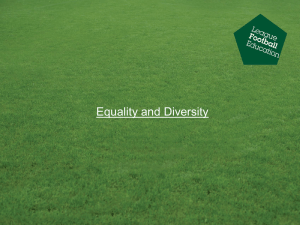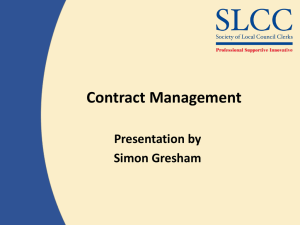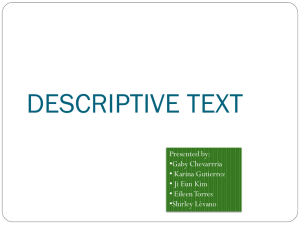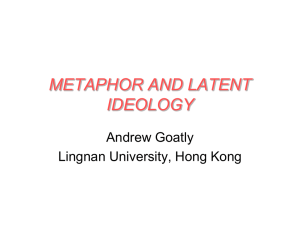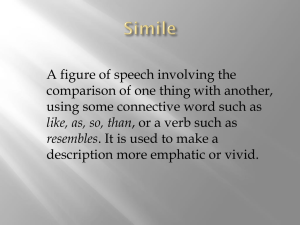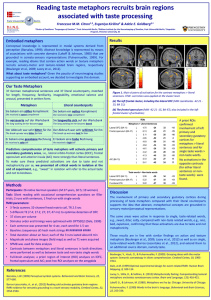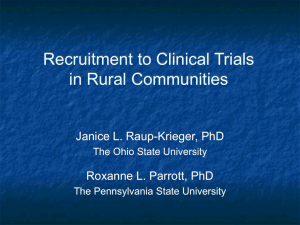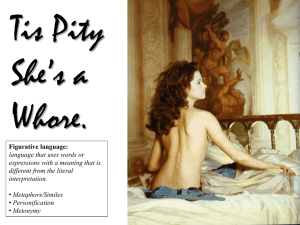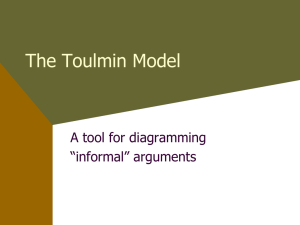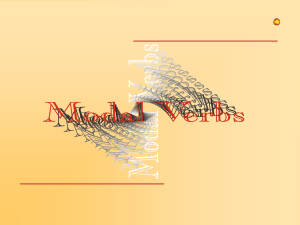Esercitazioni di lingua inglese 3 – Text analysis per
advertisement
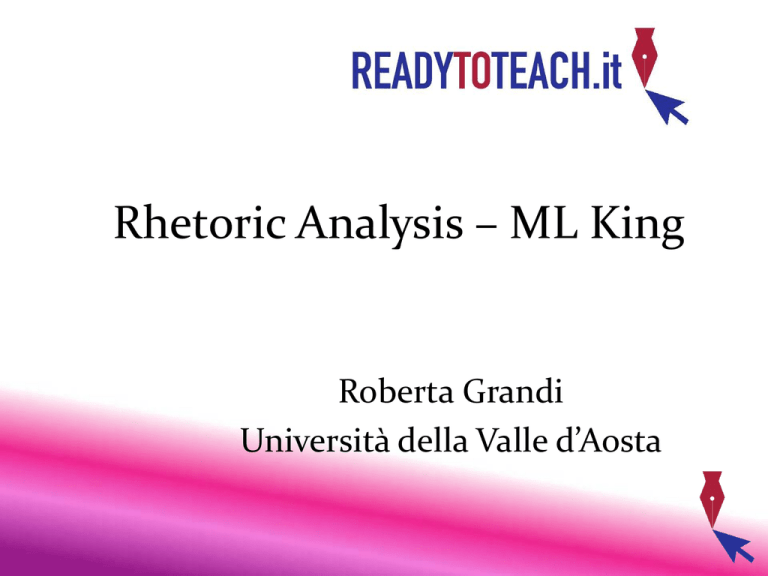
Rhetoric Analysis – ML King Roberta Grandi Università della Valle d’Aosta Bibliografia: • Alan Partington – Charlotte Taylor, Persuasion in Politics, Milano, Led, 2010 Binomials (persuasion p. 69) Two or more words or phrases (belonging to the same grammatical category), having some semantic relationship and joined by some syntactic device (and, or). By and large; time and again Law and order, assault and battery, aid and abet; on or before, bow and arrow Full faith and credit; upon and after; advice and consent, here and there Last will and testament; cease and desist, fit and proper; keep and maintain; new and novel Bicolons • Expressions containing two parallel phrases (more extended than binomials). • They shall run and not be weary / they shall walk and not faint (Bible, Isaiah 40:31) • Whether you are citizens of America / or citizens of the world (John F. Kennedy) Binomials and Bicolons The South Africa so many have sacrificed so much to achieve is within sight. Together let us walk this last, long gruelling mile to reach a non-racial, non-sexist society, where all our people will be equal before the law. Together we have it in our power to defeat those who continue to kill to maintain the old order. We have it in our power to transform our country into the peaceful and prosperous homeland of all our people. Let us work together to achieve these goals. Let us vow never to celebrate another Christmas in chains. Nelson Mandela Binomials and Bicolons The South Africa so many have sacrificed so much to achieve is within sight. Together let us walk this last, long gruelling mile to reach a nonracial, non-sexist society, where all our people will be equal before the law. Together we have it in our power to defeat those who continue to kill to maintain the old order. We have it in our power to transform our country into the peaceful and prosperous homeland of all our people. Let us work together to achieve these goals. Let us vow never to celebrate another Christmas in chains. We have a right to be free, and we shall be free! How is it called the “repetition of a sequence of words at the beginning of neighbouring clauses”? Anaphora Tricolon (or three-part list) • The repetition of three items (with possible variations) • Ask me my three main priorities for government and I tell you: education, education and education. (Tony Blair) • It is a riddle wrapped in a mystery inside an enigma. (Winston Churchill) • First they ignore you, then they laugh at you, then they fight you. Then you win. (Mahatma Ghandi) Antithesis (or contrasting pair) (p. 73) • A structure containing two parts which are parallel in structure but opposed in meaning. • So they go on in strange paradox, decided only to be undecided, resolved to be irresolute, adamant for drift, solid for fluidity, all-powerful to be impotent. (Winston Churchill) Oxymoron (p. 75) • A structure in which two apparently contradictory elements are combined in a single word, phrase or epigram • Bittersweet; a deafening silence, noble savage, being cruel to be kind. • Very often the opposition is evaluative Identify binomials, bicolons, or tricolons. We hold these truths to be self-evident, that all men are created equal, that they are endowed by their Creator with certain unalienable Rights, that among these are Life, Liberty and the pursuit of Happiness. --That to secure these rights, Governments are instituted among Men, deriving their just powers from the consent of the governed, --That whenever any Form of Government becomes destructive of these ends, it is the Right of the People to alter or to abolish it, and to institute new Government, laying its foundation on such principles and organizing its powers in such form, as to them shall seem most likely to effect their Safety and Happiness. (United States Declaration of Independence) Identify binomials, bicolons, or tricolons. We hold these truths to be self-evident, that all men are created equal, that they are endowed by their Creator with certain unalienable Rights, that among these are Life, Liberty and the pursuit of Happiness. --That to secure these rights, Governments are instituted among Men, deriving their just powers from the consent of the governed, --That whenever any Form of Government becomes destructive of these ends, it is the Right of the People to alter or to abolish it, and to institute new Government, laying its foundation on such principles and organizing its powers in such form, as to them shall seem most likely to effect their Safety and Happiness. Identify binomials and three- part lists • We, therefore, the Representatives of the United States of America, in General Congress, Assembled, appealing to the Supreme Judge of the world for the rectitude of our intentions, do, in the Name, and by Authority of the good People of these Colonies, solemnly publish and declare, That these united Colonies are, and of Right ought to be Free and Independent States; that they are Absolved from all Allegiance to the British Crown, and that all political connection between them and the State of Great Britain, is and ought to be totally dissolved; and that as Free and Independent States, they have full Power to levy War, conclude Peace, contract Alliances, establish Commerce, and to do all other Acts and Things which Independent States may of right do. And for the support of this Declaration, with a firm reliance on the protection of divine Providence, we mutually pledge to each other our Lives, our Fortunes and our sacred Honor. (United States Declaration of Independence) We, therefore, the Representatives of the united States of America, in General Congress, Assembled, appealing to the Supreme Judge of the world for the rectitude of our intentions, do, in the Name, and by Authority of the good People of these Colonies, solemnly publish and declare, That these united Colonies are, and of Right ought to be Free and Independent States; that they are Absolved from all Allegiance to the British Crown, and that all political connection between them and the State of Great Britain, is and ought to be totally dissolved; and that as Free and Independent States, they have full Power to levy War, conclude Peace, contract Alliances, establish Commerce, and to do all other Acts and Things which Independent States may of right do. And for the support of this Declaration, with a firm reliance on the protection of divine Providence, we mutually pledge to each other our Lives, our Fortunes and our sacred Honor. Who do you think “the Supreme Judge of the world” is? What other lexis relating to the same topic is present? We, therefore, the Representatives of the united States of America, in General Congress, Assembled, appealing to the Supreme Judge of the world for the rectitude of our intentions, do, in the Name, and by Authority of the good People of these Colonies, solemnly publish and declare, That these united Colonies are, and of Right ought to be Free and Independent States; that they are Absolved from all Allegiance to the British Crown, and that all political connection between them and the State of Great Britain, is and ought to be totally dissolved; and that as Free and Independent States, they have full Power to levy War, conclude Peace, contract Alliances, establish Commerce, and to do all other Acts and Things which Independent States may of right do. And for the support of this Declaration, with a firm reliance on the protection of divine Providence, we mutually pledge to each other our Lives, our Fortunes and our sacred Honor. • The “Supreme Judge” is God. Other religious lexis includes “Divine Providence” and “sacred”. Metaphors • A figure of speech in which a name or quality is attributed to something to which it is not literally applicable. • A word or expression that is used to talk about an entity or quality other than that referred to by its core, or most-basic meaning. • Basis / Grounds: a certain quality usually belonging to an entity • Source: the original entity for the grounds • Target: the different entity to which the quality (grounds) is applied • Metaphors always express evaluation Metaphors Metaphor Target Source Grounds of resemblance evaluation Richard the Lion-Heart Richard The lion’s heart Courage, strength Good Sally is a block of ice Sally Block of ice Coldness bad Metaphors Metaphor Target Source Grounds of resemblance evaluation Richard the Lion-Heart Richard The lion’s heart Courage, strength Good Sally is a block of ice Sally Block of ice Coldness bad James is a fox James The fox Cunning, smart good Juliet is the sun Metaphors Metaphor Target Source Grounds of resemblance evaluation Richard the Lion-Heart Richard The lion’s heart Courage, strength Good Sally is a block of ice Sally Block of ice Coldness bad James is a fox James The fox Cunning, smart good Juliet is the sun Juliet The sun Bright, luminous The centre of Romeo’s existence good Metaphors Metaphor A puppet government Operation Desert Storm Sunshine government Crusade against terror Target Source Grounds of resemblance evaluation Metaphors Metaphor Target Source Grounds of resemblance evaluation A puppet government The government A puppet Manipulated / moved by someone else bad Operation Desert Storm Operation Desert storm Sudden, deadly, in an Arabic place Good Sunshine government government Sunshine Light, clarity, transparency good Crusade against terror Terror Crusade Religious war, dedication Good / bad according to the public Similes Simile Encyclopaedias are like gold mines Milosevic is like a junior-league Hitler. Target Source Grounds of resemblance Evaluation Similes Simile Target Encyclopaedias are like gold mines Milosevic is like a junior-league Hitler. Source Grounds of resemblance Evaluation encyclopaed Gold mines ias Rich of precious things if you dig in Good Milosevic a) An evil dictator b) Minor, inferior Bad junior-league Hitler Metonymies In a metonymy, some entity is alluded to by mention of something else connected or associated with it. The Crown The bottle New faces Lend a hand New blood A head-count Some metonymies can be topological Washington, the White House, Downing Street, il Vaticano We have always remained loyal to the crown. The crown here stands to symbolize the king of a particular country. This metonymy is used commonly when talking or writing. The House was called to order. This means that the 'members' of a House, assuming that it's a House of Parliament, were called to order. He is a man of cloth. This only means to say that the man who the sentence is talking about is a man who belongs to a religious sect; cloth signifies the 'robes' worn by religious men. She works with a newspaper. Here newspaper stands to represent a group of journalists and editors working together to write news. “The pen is mightier than the sword” (Edward Bulwer Lytton's play Richelieu). Identify and explain the metonymy/ies in this sentence The "pen" stands in for "the written word" The "sword" stands in for "military aggression and force“ The rhetoric expression is used to underline the power of written papers which can go beyond that of physical strength. Personification • is giving human traits (qualities, feelings, action, or characteristics) to non-living objects (things, colors, qualities, or ideas). • For example: The window winked at me. • The verb, wink, is a human action. A window is a non-living object. Personification Identify the object being personified and the meaning of the personification. The wind sang her mournful song through the falling leaves. The video camera observed the whole scene. The strawberries seemed to sing, "Eat me first!" The rain kissed my cheeks as it fell. The daffodils nodded their yellow heads at the walkers. The china danced on the shelves during the earthquake. The car engine coughed and sputtered when it started during the blizzard. Martin Luther King, Jr. I Have a Dream delivered 28 August 1963, at the Lincoln Memorial, Washington D.C. http://sixminutes.dlugan.com/speech-analysis-dream-martin-luther-king/ 1. Can you recognize two quotations from one of the texts analysed before? Why does King use them? 2. Identify two anaphoras. 3. Identify the repetition of one parallel structure. 4. In paragraphs 3-4 we find an extended metaphor, what is it? Underline all related vocabulary. 5. Identify and analyse a simile 6. What is the meaning of the idiomatic expression “to blow off steam”? 7. ML King was a clergyman. What elements of his language make it evident? 8. Identify a bicolon. 9. Identify and analyse three metaphors.
